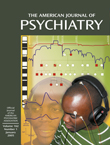Quetiapine-Induced Weight Gain and Escitalopram
To the Editor: Quetiapine-induced weight gain in an adolescent girl started with treatment with adjunctive escitalopram only. A slight decrease in weight gain was observed as antipsychotic treatment was shifted from quetiapine to amisulpride. However, reintroduction of quetiapine was followed by a novel spectacular increase in weight, confirming the potentiation of quetiapine-induced weight gain by escitalopram.
Weight gain induced by atypical antipsychotics is a well-known side effect (1), particularly damaging to an adolescent’s self-image and related to an increase in the risk for diabetes mellitus (2). Among the atypical antipsychotics available in Europe, quetiapine seems to be associated with a lower weight gain (3).
Amy, a 16-year-old adolescent, was treated with quetiapine for a first psychotic episode over 5 months with an absence of weight gain. Because her depressive symptoms were pronounced after remission of her psychotic symptoms, the introduction of escitalopram was followed by a dramatic increase in weight (8 kg over 1 month). This worrisome side effect led to replacing quetiapine with amisulpride. Quetiapine discontinuation was followed by a transient decrease in weight gain. The reappearance of severe psychotic symptoms with amisulpride treatment led us to reintroduce quetiapine because Amy was previously responsive to this treatment. Unfortunately, a novel dramatic increase in weight was observed, with an additional 8-kg gain over 1 month. Discontinuation of escitalopram and replacement by topiramate was followed by weight stabilization.
A phasic craving for carbohydrate has been described with citalopram (4) and paroxetine (4, 5). As during escitalopram treatment, a decrease in weight gain followed transient discontinuation of quetiapine, so we may attribute the weight gain to the specific association rather than understand it as an unusual weight gain with escitalopram. As far as we know, a weight gain resulting from an association of quetiapine and escitalopram has not been reported.
Susceptibility to weight gain was obvious for this patient, and an overweight family trend could explain part of her predisposition. However, the weight gain induced by quetiapine was absent before the introduction of escitalopram. Therefore, the association of quetiapine and escitalopram appears to potentiate dramatically the neuroleptic-induced weight gain and should lead to further investigation. Antipsychotic-induced weight gain could be mediated by different factors, including important ones that are independent from the antipsychotic treatment itself.
1. Allison DB, Mentore JL, Heo M, Chandler LP, Cappelleri JC, Infante MC, Weiden PJ: Antipsychotic-induced weight gain: a comprehensive research synthesis. Am J Psychiatry 1999; 156:1686–1696Abstract, Google Scholar
2. Sussman N: The implications of weight changes with antipsychotic treatment. J Clin Psychopharmacol 2003; 23:S21-S26Google Scholar
3. Wirshing DA, Spellberg BJ, Erhart SM, Marder SR, Wirshing WC: Novel antipsychotics and new onset diabetes. Biol Psychiatry 1998; 44:778–783Crossref, Medline, Google Scholar
4. Bouwer CD, Harvey BH: Phasic craving for carbohydrate observed with citalopram. Int Clin Psychopharmacol 1996; 11:273–278Crossref, Medline, Google Scholar
5. Harvey BH, Bouwer CD: Neuropharmacology of paradoxic weight gain with selective serotonin reuptake inhibitors. Clin Neuropharmacol 2000; 23:90–97Crossref, Medline, Google Scholar



